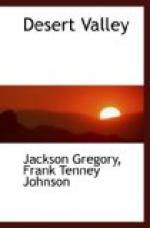‘I’m two-thirds cowboy now,’ he chuckled. ’A few more days of this and I’ll be coming to you and asking for a job! It won’t do, my boy. It won’t do. Especially at a time like this. You make your drive and I’ll make mine. And I’ll bet you a new twenty-dollar hat that when you get back I’ll have found gold again.’
So the Longstreets went back to Bear Valley and the drive began. Howard started his cattle moving at three o’clock the next morning. And almost from the beginning, although everything started auspiciously, he encountered hardship. At ten o’clock that morning he came upon a dead calf, its throat torn out as though by a ravening monster wolf; a section of the flesh seemed to have been removed by a sharp knife. That was nothing; to him it merely spelled Kish Taka, and Kish Taka was his friend and welcome. But as he rode on, reflecting, he read more in the omen. If Kish Taka were here, in the hills, then somewhere near by Jim Courtot had passed. Then shortly after noon he came upon what he knew must be the work of Jim Courtot. And he surmised with rising anger that recently Courtot had seen Sanchia and that again Courtot was Sanchia’s right hand. Here was a little hollow; on two sides were steep banks. Along these banks lay four big steers, dead, a rifle bullet through each one. Already the buzzards were gathering.
Dave Terril came upon him and found him bending over one of the big stiffening bodies. Howard’s face was white, the deadly hue of rage.
‘Who done that for you, Al?’ muttered Dave wonderingly.
‘Jim Courtot!’
‘Why don’t you go get him, Al?’
‘Why don’t I?’ said Howard dully.
Why did he not lay a fierce hand upon the wind that danced over the hills? It was no more elusive than Jim Courtot. Why did not Kish Taka, the eternally vigilant, come up with his prey? Nowhere in the world is there so baffling a quarry as a hunted man. Jim Courtot struck and vanished; he played the waiting game; he would give his right hand for Howard’s death, his left hand for the Indian’s. But in his heart, his visions his own, he was afraid.
Before they came to Sunderberg’s Meadows, where it had been arranged that the herd was to pasture that night, they saw the wide-flung grey films of smoke. Accident or hatred had fired the dry grass; flames danced and sang their thin songs of burning destruction; the wide fields were already black. Howard had bought and paid for the pasture land; the loss was his, not Sunderberg’s; Courtot, if Courtot it was, or perhaps Monte Devine or Ed True, had been before him. Sanchia’s venom—for, be the hand of the agent whose it may, he recalled always the look in Sanchia’s eyes and the threat from Sanchia’s lips—seemed to travel with him and in front of him. His cattle browsed that night on a rocky, almost grassless ground, making the best of what poor shrub growths they could lay their dry tongues to. There was no water; the pools lay in the heart of a smouldering tract too hot to drive across.




